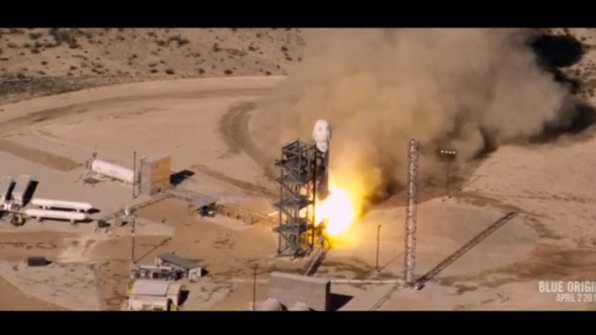
NEAR VAN HORN, TEXAS, United States (Reuters) — Jeff Bezos’ space transportation company Blue Origin successfully launched and landed for the third time a suborbital rocket capable of carrying six passengers, taking another step on its path in developing reusable boosters, the company said on Saturday (April 2).
The New Shepard rocket and capsule blasted off from a launch site in West Texas on Saturday at an undisclosed time, and landed minutes later back at a landing pad, the company said. The capsule, which was flying autonomously, parachuted to a nearby site and was recovered, the company said.
“Perfect booster landing,” Bezos wrote on Twitter. Blue Origin declined to comment on the test but said on Twitter, “Congrats Blue team on today’s (flight)!”
Saturday’s flight marks the third successful launch-and-land for the rocket, with similar missions completed in January and November.
Bezos, the founder of Amazon.com Inc, said earlier this month that Blue Origin expects to begin crewed test flights of the New Shepard next year and begin flying paying passengers as early as 2018.
Blue Origin and Elon Musk’s SpaceX are among a handful of companies working to develop rockets that can fly themselves back to Earth so they can be refurbished and flown again, potentially slashing launch costs.
For now, Blue Origin is flying suborbital rockets, which lack the speed to put spacecraft into orbit around Earth.
The New Shepard rose through clear skies to an apogee of 339,138 feet (103,369 meters), the company said.
The engine that powers the pocket restarted at 3,635 feet (1,108 meters) above ground level “and ramped fast for a successful landing,” the company said.







